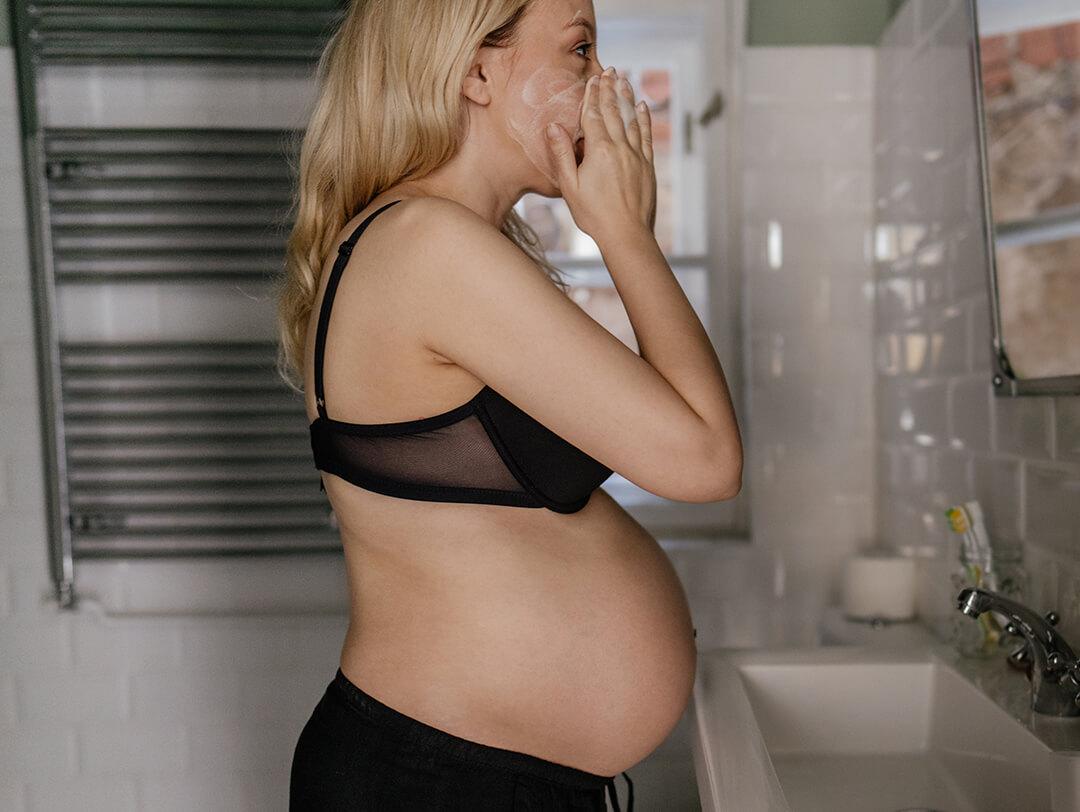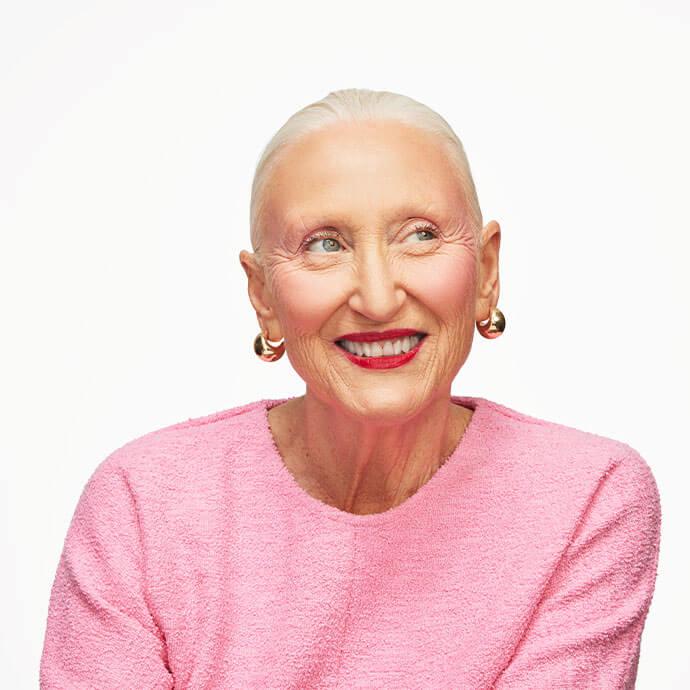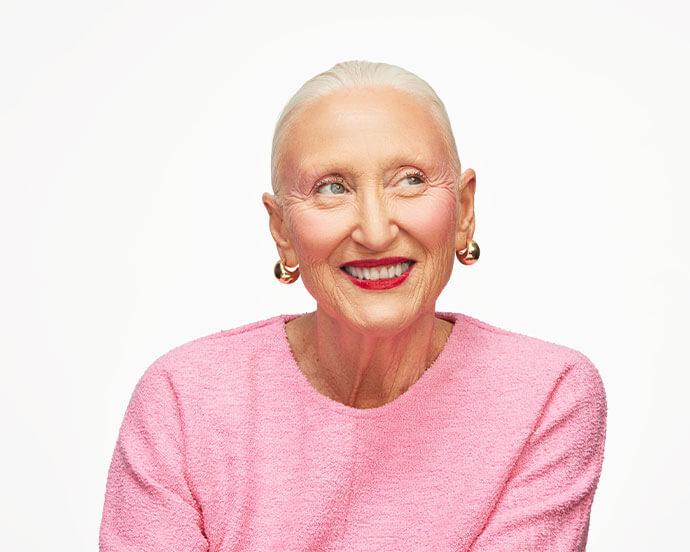A Complete Guide to Navigating Your Skincare Routine When Pregnant



Maddie Aberman


Everyone’s pregnancy is different. That’s why your doctor’s recommendations are always best. A quick Google search on pregnancy-safe skincare can be overwhelming and confusing. Sure, there are a few ingredients you might feel comfortable keeping in your routine, but beyond that, your doctor can help you determine what’s best for you and your journey.
Before getting excited about your pregnancy glow, you’ll need to take stock of your current skincare routine and the active ingredients within them. Pregnant women will tell you that the way you think about your skin and what it absorbs will have you thinking about your body in a completely different way.
“The skin is the largest organ in the body and it easily absorbs ingredients into the bloodstream,” says esthetician Josie Holmes. “Most of these potentially harmful ingredients are active chemicals. This includes retinols, hydroquinone, aluminum chloride, formaldehyde, whitening creams, sulfates, fragrances, and more.” While there are some ingredients you’ll definitely want to completely steer clear of (like your favorite retinoids, sorry!), there’s a lot that’s still unknown.
“There are still very few studies evaluating the safety of many skincare products, because no one wants to do studies on pregnant humans,” says dermatologist Hadley King, MD. Dr. King’s advice? It’s best to err on the side of caution. Taking a conservative approach and eliminating unnecessary products can save you stress down the line. Get ready to take a deep dive into the do’s and don’ts of adopting a pregnancy skincare routine as we re-examine everything from your anti-aging regimen to your go-to acne products.


It's about glam time you treated yourself.
MEET THE EXPERT
Josie Holmes is an esthetician at SKINNEY Medspa.
Hadley King, MD, is a board-certified dermatologist based in New York City.
Deanne Mraz Robinson, MD, is a board-certified dermatologist and partner at Modern Dermatology in Westport, CT.
What’s Safe to Use While Pregnant?
Before we break down your go-to pregnancy skincare routine, let’s take a deep dive into the ingredients you can—and can’t—use.
Say No to Retinol
While you may rely on retinol to keep signs of aging at bay, using retinoids during pregnancy is considered a major no-no. That’s because retinol is absorbed into the skin to impact the rate of cellular turnover. “Because it is absorbed, it may reach the bloodstream and travel to the fetus, interfering with fetal development and leading to birth defects,” says dermatologist Deanne Mraz Robinson, MD.
Swap Your Salicylic Acid for Glycolic or Lactic
Anything that contains salicylic acid. “Salicylic acid and benzoyl peroxide should generally be avoided,” says Dr. King. Although salicylic acid is often considered the holy grail of acne prevention, that doesn’t mean you can’t slough off dirt and bacteria with a chemical exfoliator. Instead, simply reach for glycolic acid or lactic acid instead, which are considered safe for use during pregnancy. You’ll also want to skip out on certain professional treatments (like chemical peels that contain salicylic acid) and Botox.
What Are Some Common Pregnancy Skincare Issues?
From hormonal acne (which is common during the first trimester) to stretch marks, dry skin, and melasma (aka hyperpigmentation), there are a variety of changes you may begin to notice as new issues emerge and existing skin concerns begin to flare up. “It's a time when hormones are shifting and that impact on the skin ranges from sebum production, inflammation levels, hair growth cycle changes, new sensitivities, and pigment changes,” says Dr. Robinson.
The most common complaint is melasma. The pesky appearance of dark spots is also commonly referred to as the “pregnancy mask” and is caused by an increase in the production of melanin. “This is why being out in the sun makes melasma worse, and women who are pregnant during the summer are more prone to getting it,” says Dr. Robinson. Another form of melasma is the linea nigra, which is a dark vertical line that appears down your belly during pregnancy, commonly referred to as the “pregnancy line.”
While all these changes can be daunting, remember they’re only temporary—and with the right routine, you can certainly minimize the impact of the side effects your skin may be experiencing now that you’re expecting.
Your Guide to a Pregnancy Skincare Routine
1. Double Cleanse
Give your skin a good, deep clean by adding a double cleanse to your skincare routine. Start by using a cleansing balm, like the SUNDAY RILEY Blue Moon Clean Rinse Cleansing Balm, a hydrating balm that removes makeup while calming and soothing dry skin. We were shocked at how easily it removed waterproof mascara.
Then, follow up with a gentle cleanser. We’re loving the SATURDAY SKIN Rise + Shine Gentle Cleanser. “Implementing a double cleanse helps to purify pores, balance out oil production, exfoliate the skin, and even allows for better product penetration,” says Holmes.
2. Exfoliate Twice a Week
If you want to slough off dead skin cells and need an effective alternative to salicylic acid, opt for a glycolic or lactic acid treatment instead, like the SUNDAY RILEY Good Genes All-in-One Lactic Acid Treatment. Not only will it reduce the appearance of fine lines to reveal glowing skin, but it also aids in minimizing dark spots, a common pregnancy culprit. It’s a win-win.
3. Moisturize Well
While moisturizing is always an important step in any skincare routine, you’ll probably find yourself reaching for a hydrating lotion more than ever before if you’re expecting, especially as your skin stretches. “Supporting the barrier function with lipid-based moisturizers can help it to retain moisture and curb itchiness,” says Dr. Robinson. We especially love the nourishing formula of the ONEKIND Dream Cream Nighttime Moisturizer, which combines squalane, chamomile, and rosehip oil which work together to deeply hydrate while also calming inflammation.
4. Opt for Physical Sunscreen
Sunscreen is a necessity in any skincare routine, especially if you’re pregnant, as your skin could be more sensitive to the sun’s harmful UV rays. Steer clear of oxybenzone (an ingredient commonly found in chemical sunscreens), which can have an adverse effect on the fetus, and instead opt for a physical sunscreen or mineral sunscreen that employs zinc oxide or titanium dioxide to protect against the sun’s harmful UV rays. We can’t stop reaching for KINSHIP Self Reflect Probiotic Moisturizing Sunscreen Zinc Oxide Broad Spectrum SPF 32 for its soothing and hydrating formula and glow-giving tint. Check out our complete guide to pregnancy-safe SPF choices.
5. Try a Relaxing Face Mask
Pregnancy is the perfect time to indulge in self-care, so take the opportunity to pamper yourself with an at-home spa day. All you need is a nourishing mask to turn your evening routine into an indulgent experience. “Lowering stress helps all of our body's systems,” says Dr. Robinson. “Lower stress levels equal lower cortisol levels which equal lower inflammation levels.” Be sure to steer clear of any potentially harmful ingredients. Instead, opt for a mask that's calming and detoxifying, like the LOOPS Clean Slate Mask, which contains volcanic ash, aloe vera, and bamboo water to replenish your skin with vitamins, electrolytes, and essential nutrients. We love how refreshing this mask makes our skin feel after using it.
Chances are, if you’re pregnant, you’ve already cut things out of your diet and your daily routine, but you might not realize you’ll also have to make some changes to your beauty regimen. Don’t stress! Use our guide on pregnancy-safe skincare ingredients to help you build the perfect beauty routine while you’re expecting. Don’t overdo it—keep it simple and give your skin a chance to breathe as it adjusts to the many changes it’s experiencing. “I always tell my clients that less is more during this time,” says Holmes. When in doubt, always consult your doctor and dermatologist, as they’re there to help and will be your best resource.
Looking for more recommendations to transform your beauty routine? Take our Beauty Quiz now to get started with your own IPSY beauty subscription. Already a member? Refer your friends to earn points, which you can use toward products. Either way, don’t forget to check us out on Instagram and TikTok @IPSY.
Like this article? Share it with your friends by clicking the icons below!
Liked this post? Share!
Related Stories


Skin
How to Adjust Your Skincare Routine for Mature Skin in the Winter
Published on Dec 4, 2025 • 7 min read


Skin
Meet the Best Moisturizers for Winter, According to Dermatologists
Published on Dec 1, 2025 • 9 min read


Skin
What Is Inflammaging—and Why Everyone’s Talking About It
Published on Dec 1, 2025 • 8 min read


Skin
6 Skincare Trends to Have on Your Radar in 2026, According to Experts
Published on Dec 1, 2025 • 7 min read


Skin
We Grabbed Our Crystal Ball and Found These 6 Skincare Predictions for 2025
Published on Dec 10, 2024 • 7 min read


Skin
Simple Self-Care Tips That Actually Make a Difference
Published on Nov 13, 2025 • 12 min read


Skin
These 9 Face Scrubs Will Unlock Soft and Smooth Skin on Contact
Published on Nov 5, 2025 • 10 min read


Skin
10 Thanksgiving Foods That Will Have Your Skin Coming Back for Seconds
Published on Oct 15, 2025 • 7 min read


Beauty Picked Just for You
Get 5 products worth up to $70
Plus exclusive access to epic deals up to 80% off
Starting at just $14/month. Cancel anytime.